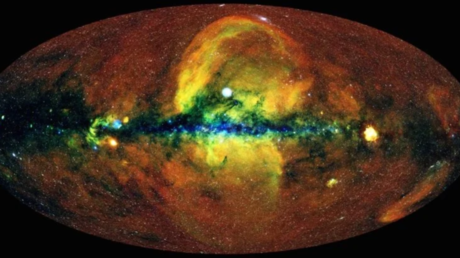
A new survey of the sky in the X-ray spectrum has captured hitherto unseen, but incredibly large, structures hiding in plain sight in the Milky Way and beyond.
The structures in question are giant bubbles composed of X-rays, emanating from the galactic center and extending beyond, both above and below, the galactic plane.
They are so big that they dwarf the Fermi bubbles of gamma radiation humanity has already observed.
The findings were made by a team of astrophysicists led by Peter Predehl of the Max Planck Institute for Extraterrestrial Physics in Germany.
Predehl and his team suspect the truly gargantuan X-ray and Fermi bubbles are linked and may share a common, violent point of origin.
The areas above and below the galactic plane, or the disc section inhabited by the vast majority of matter in the Milky Way, including stars, planets, nebula and assorted other bodies, are comparatively empty.

In 2010, the Fermi gamma-ray telescope spotted the so-called Fermi bubbles, structures filled with hot gas and magnetic fields which give off telltale gamma radiation, that extend nearly 30,000 light-years in each direction.
Leading theories suggest these bubbles are the result of past activity in the galactic center, but no one knows exactly what that might have been. Many speculate it could have been caused by a massive cluster of star births taking place almost simultaneously or perhaps even a temper tantrum from a supermassive black hole which has since subsided.
With this as backdrop, the recent discovery of these massive X-ray bubbles may allow the scientific community to hone in on the source of both types of bubble.
The X-ray bubbles were spotted by eROSITA, an X-ray telescope onboard the Spektr-RG space observatory which previously beamed back a handy galactic map of the Milky Way that captured numerous objects humanity had never witnessed before.
The truly vast X-ray bubbles extend out 45,661 light-years from the galactic center, dwarfing the Fermi bubbles.
“The Fermi bubbles and large-scale X-ray emission revealed by eROSITA show remarkable morphological similarity,” the researchers wrote in their paper.
“We therefore suggest that the Fermi bubbles and the eROSITA structure are physically related, and refer to the latter as ‘eROSITA bubbles’. Our discovery confirms the previously suggested common origin of the two objects.”
The Fermi bubbles are elliptical while the eROSITA bubbles appear to be almost perfectly spherical. The eROSITA ones are also significantly larger and are comparable in size to the galactic disc itself.
The edges of the eROSITA bubbles are also bright with X-rays, indicating that the gas here is hotter than the gas around it, suggesting it may be a kind of shockwave from a massive energetic event.

While starburst activity might explain the bubbles, it would be a bit of a stretch in terms of energy output required to produce structures of this scale. However, a galactic supermassive black hole that is accreting material on a vast scale could possibly fit the bill, as could extreme supernova activity.
While speculation about and investigation into the bubbles continues, we now have direct evidence that plasma can be reheated thanks to the discovery, which will help us explore further back in time to the origins of the Milky Way and perhaps the universe itself.
Think your friends would be interested? Share this story!




